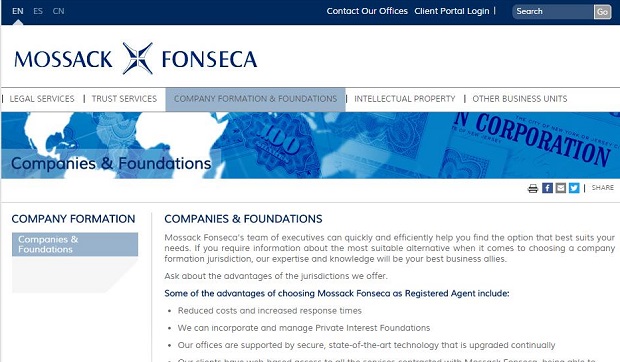Associates of Russian President Vladimir Putin, the king of Saudi Arabia, and possibly some wealthy clients of the Royal Bank of Canada are among those whose offshore banking transactions were exposed in a massive data leak now known as “the Panama Papers.”
Some 11 million documents held by the Panamanian law firm Mossack Fonseca were leaked to the media. The documents revealed the use of offshore tax havens by heads of states, famous athletes, billionaires, and organizations.
The papers came out in an investigative report published on Sunday by the International Consortium of Investigative Journalist (ICIJ) and several media outlets including the CBC, the Canadian Press and the German newspaper Süddeutsche Zeitung. All in all, more than 370 journalists from nearly 80 countries reviewed the documents.
“The leak exposes the offshore holdings of 12 current and former world leaders and reveals how associates of Russian President Vladimir Putin secretly shuffled as much as $2 billion through banks and shadow companies,” according to the ICIJ. “The files contain new details about major scandals ranging from England’s most infamous gold heist, an unfolding political money laundering affair in Brazil and bribery allegations convulsing FIFA, the body that rules international soccer.”
Another 128 other politicians and public officials from around the world used the services of the firm, according to ICIJ. The investigative journalist group said the documents illustrate how “a global industry of law firms and big banks sell financial secrecy to fraudsters and drug traffickers as well as billionaires, celebrities, and sports stars.”
Ramon Fonseca, a co-founder of Mossack Fonseca, told Panama’s Channel 2 TV station that the documents obtained by ICIJ were authentic. He said they were obtained through hacking.
Mossack Fonseca was described as a powerful law firm with branches in London, Beijing, Miami, Zurich and more than 35 other places around the globe.
“RBC works within the legal and regulatory framework of every country in which we operate,” Suzanne Willers, spokesperson for RBC told CGE. “Tax evasion is illegal, and we have established controls, policies and procedures in place to detect it and prevent it occurring through RBC.
She said the bank has “an extensive due diligence process” to make sure it understands who its’ clients are and what their intentions are.
Willers said RBC makes sure “our clients have the information they need to properly file their taxes and we advise them of their obligation to do so” and recommends they seek independent professional tax advice.
“There are a number of legitimate reasons to set up a holding company,” she said. “If we have reason to believe a client is seeking to commit a criminal office by evading taxes, we would report the offence and not do business with the client.”
Among the high-profile politicians identified to have dealings with Mossack Fonseca were: Russian President Vladimir Putin, Chinese President Xi Jinping, the late father of British Prime Minister David Cameron, Ukrainian President Petro Poroshenko and Icelandic Prime Minister Sigmundur David Gunnlaugsson.
The ICIJ said the documents also included files on 33 people and companies blacklisted by the United States government due to evidence of having done business with Mexican drug lords, terrorist organizations such as the Hezbollah and nations such as North Korea and Iran.
The leaked documents cover a period of over 40 years dating from the 1970s to 2015 and provide a “day-to-day, decade-by-decade look at how dark money flows” moves through the financial system “breeding crime and stripping national treasuries of tax revenues.”


